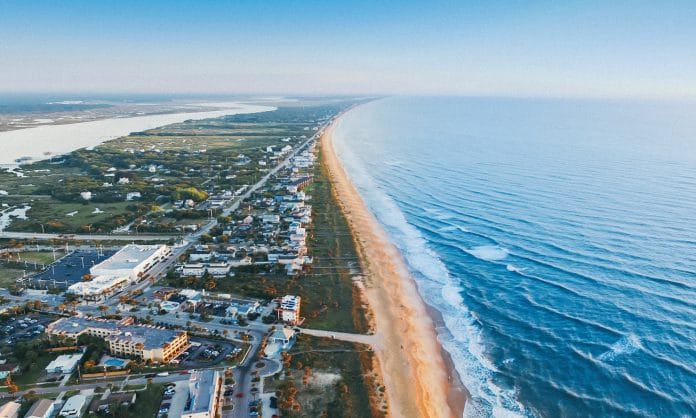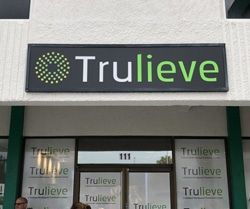If you are a Floridian, and this article doesn't enrage you, you might want to check to see if your spouse is secretly feeding you Thorazine. Yeah.
Florida, man: Why 2020 legalization failed in the Sunshine State
In late 2019, there were two viable adult-use legalization measures vying for a place on the Nov. 2020 ballot. By the end of January, both were dead. What happened?
If you want to understand how surreal things have become on Florida’s winding and rutted path to full legalization, you might hang out at Carlos Hermida’s Chillum Glass Gallery and CBD Dispensary in Tampa.
Hermida’s shop is located on 7th Avenue in the historic Ybor City neighborhood, a kind of Bourbon Street lite: The strip leans hard into the touristic appetite for cigars, tattoos, and hookah pipes.
Hermida, who occupies a storefront a few doors down from Coyote Ugly, is a burly man with an amiable vibe and a bushy black beard just beginning to bleed gray. His space is packed with all kinds of merch, from pipes to apparel. A chalkboard advertises CDB blunts among its line of $5 specials. As one might expect, Hermida is in favor of expanding Florida’s medical marijuana program to incorporate recreational use.
Or let’s say that he’s in favor of it in spirit. When canvassers for Make It Legal Florida—the organization behind a proposed constitutional amendment legalizing adult use—showed up in early January asking permission to gather signatures by his entrance, he told them no.
Looking for a medical marijuana doctor? Find one in Florida
‘I’m not a big fan’
At the time, Make It Legal Florida, which understandably avoids using an acronym, was the last of two proposals left standing with ambitions for the statewide ballot in 2020. The other one folded in late 2019 when it ran out of money.
Still, as Hermida said with a small, sphinx-like smile: “I’m not a big fan.”
The canvassers seemed confused, which is how Hermida found himself in the position of edifying the representatives of Make It Legal Florida on their own initiative.
As he sees it, the two big problems are that the initiative doesn’t allow Floridians to grow their own, and it’s too oriented toward corporate interests, funded as it is by the cannabis companies Surterra and MedMen. Hermida holds an MBA and has spent nearly a decade in and around the industry. “I’m quite jaded at this point,” he says.
When you can’t even please the NORML guy…
Here’s the odd part: His position allies him with some of the state’s most conservative politicians, the wealthy white people who fund them, and also with some of Florida’s largest corporations, including Disney,
which in 2017 banned legally possessed medical marijuana from its theme parks.
Odder still: Hermida, a card-carrying medical marijuana patient, is deputy director of the Central Florida chapter of the National Organization for the Reform of Marijuana Laws (NORML), the nation’s oldest and largest organization advocating for the legalization of adult-use cannabis.
A few days later officials with Make It Legal Florida announced they were suspending their campaign. Abandoning their quest for the Nov. 2020 ballot, they decided to regroup and aim for 2022.
If you’re seeking an explanation for the early demise of Florida’s leading 2020 legalization measure, here’s one answer: Not even the local NORML leader could support it.
But that’s hardly the whole story.
Welcome to Florida. Watch your wallet
Florida is famously weird. This is the state that all but invented kitsch and real-estate scams. It’s also a place that harbors pockets of calcified 1950s values. Special-interest sinkholes—often championed by the people in the center circle of a Venn diagram of the conservative, the white, and the aged—spout geysers of money.
With cannabis, it’s not always so obvious what’s going on. Oddball alliances and conflicting agendas require a flow chart to track.
There’s a scene in
The Life of Brian, the Monty Python Biblical parody, that perfectly fits the situation in Florida. The protagonist, Brian, gently inquires of a group of locals whether they’re part of a rebellious outfit known as the Judean People’s Front. They scoff—they are, rather, part of a different resistance group, called the People’s Front of Judea. “The only people we hate more than the Romans,” says Reg (played by the great John Cleese), “are the fucking Judean People’s Front.”
Others begin naming of other traitorous outfits, such as the Judean Popular People’s Front. Caught up in the moment, a woman sitting off to the side then derisively calls out the People’s Front of Judea.
And after a beat, Reg looks at her. “
We’re the People’s Front of Judea!”
“Oh,” she says. “I thought we were the Popular Front.”
When it comes to cannabis, that’s Florida.
Money drives the prohibitionist’s cause
On paper, Florida is a purple state—famously up for grabs in every election. It’s the state that immortalized the hanging chad.
It’s also sometimes referred to as “God’s waiting room” because
more than one in five residents is 65 or older. That means its population is uniquely primed for the palliative benefits of cannabis.
But while redder states like Oklahoma have embraced medical marijuana with a fervor, many elected Republicans in Florida still treat it like a tax on fresh air and sunshine.
The reason? Money, of course.
Last of the red-hot drug warriors
Florida is home to some of the last remnants of the Reagan-era culture-war crowd, folks like deep-pocketed donors Mel and Betty Sembler, whose Drug Free America Foundation donated millions of dollars for billboards that helped defeat medical marijuana the first time it appeared on the ballot here in 2014.
The Semblers are
lifelong marijuana foes. They’re credited with steering Nancy Reagan toward her infamous “Just Say No” campaign in the 1980s.
Now in their late 80s, the Semblers continue to be influential and deep-pocketed donors to Republican elected officials and candidates.
Meanwhile, billionaire casino magnate and Trump donor
Sheldon Adelson also donated $5.5 million to defeat the 2014 proposal. (The state’s medical marijuana amendment finally passed in Nov. 2016.)
“Florida has been this proving ground for opposition campaigns that have real resources,” says Ben Pollara, a political consultant and campaign manager for United for Care in both 2014 and 2016.
Voters, meanwhile, are all about legalization
The state’s voters left no doubt about whether they stood on the matter in 2016—a constitutional amendment legalizing medical cannabis won more than 71 percent of the vote.
Despite that overwhelming plurality, then-Gov. Rick Scott and state legislators continued with their hot-faced opposition. In the summer of 2017, Scott signed a new law that prohibited patients from smoking medical marijuana.
The
law was swiftly repealed last year, after Scott left office, but the legislature continued to wreak havoc with licensing process for the state’s dispensaries, known as Medical Marijuana Treatment Centers (MMTCs).
Most states allow growers to grow and retailers to open stores. Not Florida. The state decided its license holders had to do it all: grow the plants, package, brand, and sell the products in their own dispensaries. Each licensee could operate up to 25 retail locations, and add five more each time the state’s patient rolls increased by 100,000.
Only the wealthy need apply
That setup excluded all but the wealthiest applicants, only five of whom were given licenses during the first round in 2015. Florida then missed a deadline in 2017 to add 10 more.
The predictable result: lawsuits, and lots of them. “Dragging their feet is one way to describe it—it was very reluctantly allowing a few players to come in,” says Frazier, who filed one of the suits, on behalf of an orchid grower who was frozen out of the approval process. “It became a sort of cartel for who has clients with the best lobbyist in town.”
Sue & settle for a license
Florida state officials have largely capitulated in a number of the cases, simply to avoid losing in court. “The state basically said, ‘Sure, we’ll just settle with you and give you a license,” says Sally Peebles, an attorney with a deep history in Colorado’s legalization effort who serves on the state’s Medical Cannabis Advisory Committee.
Of the
22 MMTCs now listed on the state’s official website, 17 received licenses as a result of litigation. One
Tallahassee judge called the state’s licensing process “a dumpster fire.”
No one here is happy that the process has devolved into a Judge Judy meme. Nor are they pleased by the fact that cannabis licensees must all, by definition, be big businesses. During his gubernatorial campaign, Ron DeSantis—a Republican—labeled the system a state-sponsored “
cartel.” DeSantis is now the governor.
Market size: Huge and growing
Thanks to its size and muscular agricultural infrastructure, Florida now operates one of the nation’s largest medical marijuana markets. There are more than 300,000 registered patients here, more than in any other state.
Florida's medical marijuana industry saw sales growth of 93% in 2019.
But the whole edifice continues to teeter. Keith Blackman manages VidaCann’s dispensary in Tampa, located in a modest strip mall on a busy street. He points out that dispensaries are currently not allowed to sell gummies—edibles don’t yet have regulatory approval—although they can offer vapes, tinctures, and other widely available products. That confuses customers.
Until recently, dispensaries also couldn’t sell smokeable canannabis flower. Then the state abruptly reversed course. Dispensaries began selling flower in April 2019, and patients now purchase more than 25,000 ounces every week.
“It’s always changing,” Blackman says. “One day something’s not allowed, and the next day you come in and it’s now okay.”
Fake FARMing in Florida
As proposals for recreational use have gained traction, the state’s fractious and conflicting forces have come into stark relief. Last December, in the midst of Make It Legal Florida’s frenzied petition push, an organization called Floridians Against Recreational Marijuana (FARM) suddenly appeared on the scene,
claiming to represent various groups including “patients—such as veterans seeking affordable health care—and medical community professionals.”
It was clear from the start that the new group was powered by old culture-war Republicans.FARM never even bothered to post a website. The face of the organization was Brian Swensen, deputy campaign manager for Florida Sen. Marco Rubio’s last re-election bid. (Swensen did not return messages seeking comment.)
FARM’s prime benefactor was Pat Bainter, a secretive mega-donor whom the
Gainesville Sun recently identified as “one of Florida’s most influential operatives in GOP politics” and someone who was named in the state’s gerrymandering scandal in 2012.
Another astroturf group pops up
More surprising was the announced opposition from an organization known as the Coalition for Medical Cannabis. According to its website, the not-for-profit outfit safeguards medical marijuana patients from the ravages of—wait for it—
recreational marijuana.
Suspicious little 'medical marijuana patient advocate' groups keep popping up to oppose adult-use legalization. They're run by PR shops.
The CMC’s slapped-together
website possesses little information except for “research” about the dangers of adult-use marijuana generated by the Centennial Institute, a conservative think tank based at Colorado Christian University, a small private evangelical school based in a suburb of Denver. The CMC claims to be a national organization, but its “action alerts” make only vague references to Florida and Kentucky, and to working with Congress at a federal level.
When I contacted the CMC’s spokesman, Bob Ellsworth, he had lots to say about the dangers of recreational marijuana. Ellsworth, who has largely worked in public relations for a company called EM2P2, Inc., is also the creator of something called CannaLnx, a digital platform connecting patients, doctors, dispensaries, and other parties.
But are CannaLnx and the Coalition for Medical Cannabis real organizations?
ASA: ‘Never heard of them’
I asked Debbie Churgai, interim director of Americans for Safe Access, the nation’s oldest and largest advocacy group for medical cannabis patients, what she knew of the Florida group run by Ellsworth. Churgai said she was unaware that CMC existed until Leafly inquired. “I was surprised that I had never heard of them or that they had never reached out to us,” she says.
Ben Pollara, the longtime Florida legalization activist, offered a similar response. “I mean, if you’re a medical operator in the state of Florida, why would you be opposed to this?” he said of the adult-use measure. “The initiative specifically allows medical marijuana treatment centers to sell recreational marijuana. So I think it’s a pure political play from a smart political consultant who sees a payday that somebody’s going to get, and it might as well be him.”
Ben Pollara: ‘Obviously bullshit’
Pollara gave Ellsworth credit for a creative play.
“At a time when the popularity of these initiatives is increasing on a day by day basis, the old tactics of how to kill one of these initiatives have got to shift,” he said. “Then I guess potentially an interesting angle for trying to kill legalization is trying to triangulate like this. Which is obviously bullshit. Because everybody who’s involved and active in the space knows that for all the potential detriments to the medical cannabis system caused by legalization, there’s probably far more benefit to the overall population.”
In particular, the availability of adult-use cannabis could benefit patients who can’t afford the $300 a year it costs in Florida for caregiver appointments and a state-issued medical marijuana identification card.
Diana Dodson is a longtime medical marijuana patient and board member of the Wo/Men’s Alliance for Medical Marijuana, a national group based in Santa Cruz, California. She says she favors full legalization and deregulation. “While the medical community certainly has hard-won our gains as far as safe access to our medicine,” she says, “I don’t believe anyone in the medical community seriously wishes to hamper legalization.”
Tallahassee pols raise roadblocks
Foiled by court rulings and a public embracing the end of prohibition, Florida’s legislators last year came up with other ways to monkeywrench the forward march of legalization.
As Make It Legal Florida pressed forward collecting signatures, legislative leaders hosted
a series of “experts” to broadcast fear-mongering messages before official committees in Tallahassee.
Even more effective, at least in the short term, was a law hurriedly passed last year that created new obstacles and tighter timelines for petitioners. The new law required that county elections supervisors verify signatures within 30 days of receiving them—effectively shaving a full month off the deadline for submitting petitions.
New obstacles led to crisis
Scrambling to collect the required 766,200 signatures ahead of what they called this new “stealth deadline,”
Make It Legal Florida officials sued the state in Leon County Circuit Court on December 31, asking for more time. At that point the campaign had secured about 250,000 signatures, about one-third of the total they’d need by Feb. 1, 2020, to make the fall ballot.
Prohibitionists couldn't sway voter opinion. So they had state legislators make the ballot process almost impossible to navigate.
The following week, the state attorney general and leaders in the state House and Senate urged the Florida Supreme Court to reject the proposed constitutional amendment because the language on the ballot did not inform voters that cannabis would remain illegal under federal law.
Realizing they were far short of the necessary signatures, facing staunch opposition from state leaders, and unable to bet on a favorable ruling out of Leon County, organizers of the Make It Legal Florida campaign huddled to discuss their narrowing path forward.
On January 13, just two weeks after filing the Leon County lawsuit, Make It Legal Florida announced it was
suspending the 2020 campaign.
Nick Hansen, campaign chairman, said supporters would instead aim to put the issue on the 2022 ballot.
“The narrow timeframe to submit and verify those signatures has prompted our committee to shift focus to now gain ballot access in 2022,” Hansen said. “We’re looking forward to Supreme Court review of our efforts and working in collaboration with state leaders to ensure the supermajority of Floridians’ voices are heard.”
A few days later, state Senator Jeff Brandes
introduced a bill proposing to legalize adult-use cannabis, using language similar to that of the Make It Legal Florida campaign. It didn’t go far.
Meanwhile, medical marijuana continues to grow
For those who hold some of the highly coveted licenses to run a medical marijuana dispensaries, there’s little bemoaning the chaos that has otherwise engulfed the state. They’re too busy running booming companies.
Fluent, a Miami-based company with about 230 employees, runs a cultivation facility in Tampa. After becoming one of the state’s original five licensees in 2015, the company quickly ramped up under owner and CEO Jose Javier Hidalgo, a high-energy Venezuelan-born businessman with a background in real estate. Fluent renovated an indoor lettuce growing facility east of downtown into a state-of-the-art 20,000-square-foot cannabis growhouse.
MMJ license holders have a huge head start
Touring Fluent’s operation in the context of the most of the rest of the state’s would-be growers is like watching a competitive runner who’s been allowed to start a marathon an hour ahead of the field. In the main growing area, plants are stacked vertically in six layers that reach 22 feet high. The longest layer accommodates 108 pallets, and there are 36 plants per pallet. A team of trained plant technicians and scientists ministers to each plant, scrutinizing their light, water, and supply of nutrients. Another room holds another room of young plants from which staff makes a thousand cuts a week. The place is spotless.
Every four to six months, Hidalgo says, his team refreshes the genetics of the company’s array of plants. And they scrutinize data from each harvest to maximize each strain’s qualities—an effort spearheaded by a scientist that Fluent poached from Mars, the chocolate giant.
Faster than the speed of light
Hidalgo, a blur of upbeat energy who is based out of Fluent headquarters in Miami, greets the crew at the Tampa with thunderclap handshakes and bro hugs. He then heads downtown to one of Fluent’s retail stores. The space is sleek and minimalist—it’s a former jewelry boutique—washed in a clean white, the words “We speak cannabis” greeting customers as they’re ushered past reception. Each of the four consultation counters is numbered using glowing LED lighting from within, in the style of science-fiction stories that Hidalgos loves.
How would Fluent change if recreational passed? Hidalgo keeps close tabs on happenings in Tallahassee. “Thank God politics is not our thing,” he says. “That would be exhausting. We’re just focused on giving the absolute best product to our customers.”
But change is a given in the industry, and Fluent builds with an eye toward staying nimble: “I always say, the speed of cannabis is faster than the speed of light.”
93% growth in 2019
For the few allowed into the game, there is much growth to come. According to Leafly’s annual jobs report, sales in Florida’s medical marijuana industry increased 93% in 2019. The state now boasts the nation’s largest medical marijuana patient community, with more than 300,000 card holders. As Hidalgo puts it, “We’re in the second inning of this industry.”
Indeed, despite the moneyed and entrenched resistance to legalization, there are many more innings to be played here—and, this being Florida, many more screwballs to be thrown. And remember this: Florida’s first try at medical marijuana
failed too. See you in 2022.





